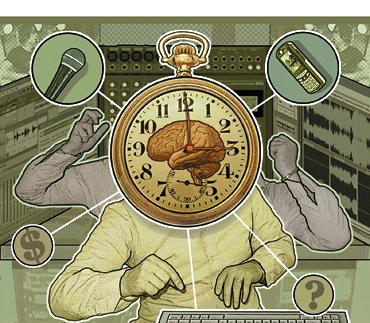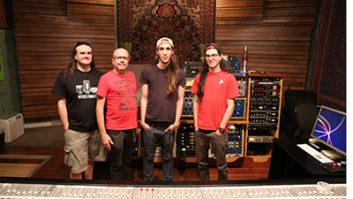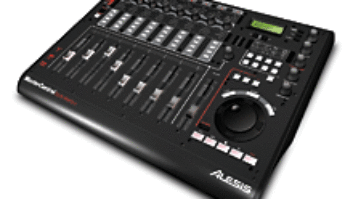
It’s midnight and you’ve been mixing until 3 a.m. every night for six nights straight trying to finish this CD on time. This is in addition to your “day job” of tracking another project, booking your next gig, getting your taxes together and spending time with your 1-year-old who’s just learned to walk. The phone rings and it’s your client in China who can’t access your ftp site and wants to send you the vocal comps for the next five songs you’re mixing. It’s 10 a.m. for them but you’re at the end of your day, your wits and your energy reserves.
If that weren’t enough, you just got an e-mail from a regular client whose project you just mastered last week that needs three remixes and wonders if you could give them a deal because they’re out of money. You go to the sink to splash water on your face to get your fourth wind and notice your studio tan. Even though it’s well into summer, you haven’t left the studio for some time.
Illustration: Tad Majewski
We’ve had to adapt quickly in a world that seems to spin faster than ever, making us work harder to survive. The 1950s view of technology freeing us for more leisure time simply isn’t true. We are always “in touch” through the ever-invasive and demanding tentacles of technology, making it harder to get away from work. In addition, changes in our industry have made our jobs more demanding than ever. Budgets have shrunk, and so work is harder to come by. Clients once dependent on outside engineers and studios now own their own gear because they can: It’s more affordable than ever. Computer and software manufacturers are playing “can you top this,” making it tough to keep your DAW stable. Every time a new processor or OS is released, you have to be sure that all your trusted, go-to plug-ins will work, sometimes as an expensive upgrade. You’re constantly playing an internal tug of war between giving your family the time it needs and your business, which provides for your family. The “boss” is harping on us to produce more to stay ahead. The bad part is that in audio, we sleep, eat and live with the boss — because the boss is us.
As a sole proprietor, you must do everything. In addition to tracking and mixing, to compete in the new world, you have to be a bookkeeper, studio tech, IT tech, software upgrade guru, assistant engineer, studio/career manager, promoter, Web expert, DVD author, MIDI programmer, auto-tuner, producer and even archivist. Not to mention, father/mother, husband/wife, chauffeur, lover, friend and counselor.
The faster we run, the more stress we get into. Our lives have gotten so fast-paced, we don’t take the time to look around and see what’s happening around us. All this stress takes a physical toll. The effects can be as subtle as feeling irritable to being driven to self-medicate and becoming someone even you don’t like. That pain in your back, crick in your neck, sore shoulder and need for new glasses may not be caused by job stress, but it can certainly make it worse.
WE ARE HOOKED
We are all communication junkies: instant messaging, text messaging, cell phones, laptops, Websites, PDAs, Bluetooth, e-mail and more. Sure it’s great for business, but this also means it’s harder to say one of the best stress-reducing words in our language: No. We can’t turn down work: It’s too scary to think that the next engineer, doing the same shuffle, would say, “Yes.” We are afraid of losing what little work comes our way, so we stay hooked up. Our cell phones are attached to us, almost umbilically — so much so that we are admonished in church, in theaters, at the doctor and at the bank to please turn off our devices. There’s fear of not working. A lot of us, me included, check e-mail five to 10 times an hour and immediately respond. Our cars have GPS so we know where we are and where we’re going, so that God forbid, we don’t get lost and, gasp — waste time! With computers everywhere (I use six between home and office), our homes have become our work and vice versa. Our lives have lost depth, dimension and downtime to our technological puppet-masters.
“Technology has made our lives 10 or 20 times more stressful than they ever used to be,” says Dr. Nathan Currier, M.D. The Indiana University-educated psychiatrist has a family practice and has been an expert medical witness specializing in post-traumatic stress disorder (PTSD). The doctor’s experience with ever-growing technological disturbance is a testament that it’s not just audio folks who experience this effect. “The cell phone is such an intrusive device, I feel that I’m never way from my patients and practice,” he says. “I’ve been backpacking in the desert and gotten a call from one of my staff in the hospital.”
Andy Deguara of A and D Studios (Sunnyvale, Calif.) puts in 40-plus hours a week, but is always hooked to his laptop and cell phone. “I don’t think I’m ever not working any more,” he says “Even if I go on vacation, I’ve got my laptop with me; I’m checking e-mails and returning phone calls. It’s something that’s constantly on my mind. I’m here at the studio during office hours and I can run sessions here 24 hours a day. When I’m busy, it’s not unusual to find me answering the phone at 1 or 2 o’clock in the morning.”
The difference between success and failure can hinge on being able to say yes when a gig comes available. In the early ’90s, things were just a bit slower, cell phones weren’t as prevalent, the beeper was king and the Internet was just an apple in DARPA’s eye. But now stress has become amplified because of the many ways we can be contacted.
WHAT CAN WE CONTROL?
The bad news is that there are some uncontrollable aspects to this situation. The days of the “audio cathedrals” have passed, with staff positions going the way of the Dodo. Freelancers rule, and while you’d think this would be liberating, with such freedom comes the responsibility to fend for you and yours without support, benefits, pensions or a union. Label work with bands or artists block-booking, once de rigueur in the studio business, has all but vanished.
Deguara has had his facility for six years and has seen his business grow, but he’s also had to adapt to clients booking shorter sessions. “The thing that’s always kept me going is the small stuff,” he explains. “Because I don’t rent my studio out for two months at a time, I don’t have the waiting list that other studios have. I can get a call on a Monday afternoon and if someone needs to get in right away, usually I can get them in by the end of the week with no problem.” When I asked how the changes in his business have affected his stress level, he responds, “It’s gotten more stressful because of the growth we’ve had, and as you get bigger, you have to do more.”
Nashville-based engineer Russ Long (Rich Mullins, Sixpence None the Richer, Carolyn Arends) was an early adopter of home recording technology and has seen the business change radically since he started in 1988. He’s had his own studio since 1994, which he originally built for mixing and overdubs. “In the past, I was doing almost all label projects,” he says. “Now I’m doing 20-percent label work and 80-percent independent bands that have an investor, or have raised the money themselves.”
It’s so inexpensive to make a record now that labels can throw small amounts of money at a lot of artists, who often do a lot of the work themselves. It’s not unusual for a band to hole up after tracking and do the majority of the overdubs themselves or with savvy friends who know a bit about audio.
For the most part, engineers who were once booked for six to eight weeks on a project, working with one band or producer, now get hired to initially track a record and perhaps mix it. “It’s extremely rare to work on one project beyond two weeks,” says Long. “On the other hand, the great thing is you don’t have to say no to something else. You can fit it in-between other jobs.” Long also talks about the added stress the freelancer faces when turning down work: “It’s extremely hard to say no. If you tell them no, then they go to somebody else, and if [that experience] goes great, the next time around, they’ll call that person first and not you.”
TAKING NAMES
But there is some good news. We can help ourselves and take action to alleviate our stress symptoms and keep us healthy. The first step is awareness. The truth is, our stress comes from more than one source, so a good inventory of what’s going on in our lives can help quantify the problem. Is your stress work-related? Financial? How are your relationships affecting your life? Family? Friends? Do you have a balance between work and play?
“People have a lot more control over their stress than they realize,” says Dr. Currier. “In my practice, I do a stress inventory, and 70 percent of the time people can identify some of the stress events in their life. The problems come when they’re not doing anything to try to control the impact of their stress either physically, emotionally or mentally.”
What about the other factors causing you stress? Are you hitting the snack machine for its convenience? Does the client love pizza and you go along so you don’t rock the boat? Do you guzzle coffee, Mountain Dew or worse to keep your edge? Your health, both mental and physical, is directly affected by what you put in your body.
“Certain foods are more stressful than others,” says Dr. Currier. “Foods high in fat content are hard to digest, and too much refined sugar doesn’t help either. It’s amazing how some people will be drinking 10, 12, 15 cups of coffee a day, or Diet Coke or Coke, and not think about it as causing stress in their life. You’ve got to think of it as liquid stress: Bathing your body in all that caffeine every day is not really helping it very much.” Is comfort food or binge eating your downfall? This adds weight to your frame, making it harder to get around, putting more tension on your joints and generally slowing you down. Not to mention the health risks associated with being overweight: diabetes, hypertension, heart disease, high cholesterol, stroke, certain types of cancer and gallbladder disease.
How well do you sleep? The call from the Chinese client mentioned above isn’t fictional; it’s a reality. It is now far easier to work with clients around the globe via phone and Internet. They may want to discuss your work in depth, just when you’re ready for, or are in bed, or you may be a day person with a family to tend to, while your local client may want to start working at 6 p.m. and end at dawn. This is harder to manage when you have a home studio out back or in the same place your family resides. Do you drink a lot of alcohol? Is it Martinis with clients after work or beers in the studio? Do you feel you have to be a reveler to be accepted and get their business? Alcohol consumption can have a direct effect on sleep patterns. Do you exercise regularly? This also affects sleep.
Much of what we’re talking about here is linked together, and even reducing some of the negative factors can have beneficial results. “The results are quite dramatic and response rates are pretty high,” says Currier about people taking action and reducing the things that are negatively affecting them. “People who take it seriously and do most of the things we talk about see dramatic improvement in their symptoms, sleep patterns, energy levels and the way they feel.”
FINDING BALANCE
Being informed can be the start of getting a handle on a quickly changing environment. Actually, using the stress-inducing technological bubble we’re surrounded with is a great source for info. Going to trade shows, reading technical papers, networking and even starting your own blog can be great sources for staying abreast of change and creating a network of mutually supportive individuals. It may sound simple, but staying in touch with a select group of pros who are going through what you are is a wonderful way to help reduce overall stress.
Getting away from audio or any all-engrossing job is always a good way to get perspective. Do you like other pursuits? Reading? Managing a little league team? I once worked with a high-powered record producer who loved making model railroads and had a huge setup in his basement that was always evolving. He would spend hours painting a roundhouse or making a tree from balsa wood and found it extremely relaxing.
You can also work some tried-and-true techniques to help you get a handle on stress. Taking vitamins, using visual imagery, meditation, self-hypnosis, exercise, yoga, a healthy lifestyle and diet can all play a huge part in reducing your stress.
Taking time for leisure can take a lot of pressure off your work-related stress. Leisure time for some means taking some kind of pill or drug to alleviate stress. We won’t get into self-medication here, but let’s just say that its effects are surely short-term. As for medically prescribed solutions, Dr. Currier has some good advice. “Medication is only a very small part of the intervention into your illness. I stress a holistic kind of approach. You have to look at all aspects of the stress in your life and try to manage it better or else a pill is not even going to work. It’s not a cure-all.”
Finding balance means finding what works for you. Taking short breaks on the job can also help. “I like taking short mental breaks where I imagine I’m in my favorite place in nature,” says Dr. Currier. Using such imagery can immediately reduce stress and give you a breather from a stressful situation.
Russ Long runs to keep himself straight, participating in four marathons and one half-marathon in the past 10 years. “There’s no phone to ring, there’s nothing else in my mind and I’m able to get away,” he says. “A lot of time I have a hard time relaxing at home. Running is extremely relaxing.” He’s also found a balance in his eating habits. “I try to eat pretty healthy and stay away from fast food and chain restaurants. I drink a lot of coffee, which is not the best, but it’s hard for me to work long if I’m not drinking coffee. I try to complement it by drinking a lot of water.” Long has also found a balance between work and being with his wife and son. “I don’t like to work 80 hours like I did at one point; I have more of a family life now than I had when I was younger, but I love work as much as I ever have.”
Andy Deguara uses the gym to relax and help him solve problems and find solutions in his business. “I try to make it to the gym if not every day, then every other day or so. When I have to concentrate on something else, it helps me solve problems I’ve been working on and gets me away from here.” He also thinks that his business has gotten better as he’s learned to adapt. “At this point, my business has probably stayed consistent, but the quality of clients has gotten better. A lot of it is getting a reputation for certain niches that we’re good at. Then we’ve slowly increased our prices a little bit to bring in a higher end of clientele.”
So the news is not all bad. We can find a balance and with a little effort, we can become less irritable, recover from stressful situations, lower our blood pressure and generally improve our health, mental and physical. Yes, there will be frustrations, failures and setbacks in our careers, but by getting in the habit of handling our hot-button issues, we can give back to ourselves what our environment takes away. By investing in long-term solutions, we can reduce the toll that stress takes on us daily.
And if none of these suggestions work for you, by all means, schedule a vacation.
Mix technical editor Kevin Becka turned in this story at 4:23 a.m.





